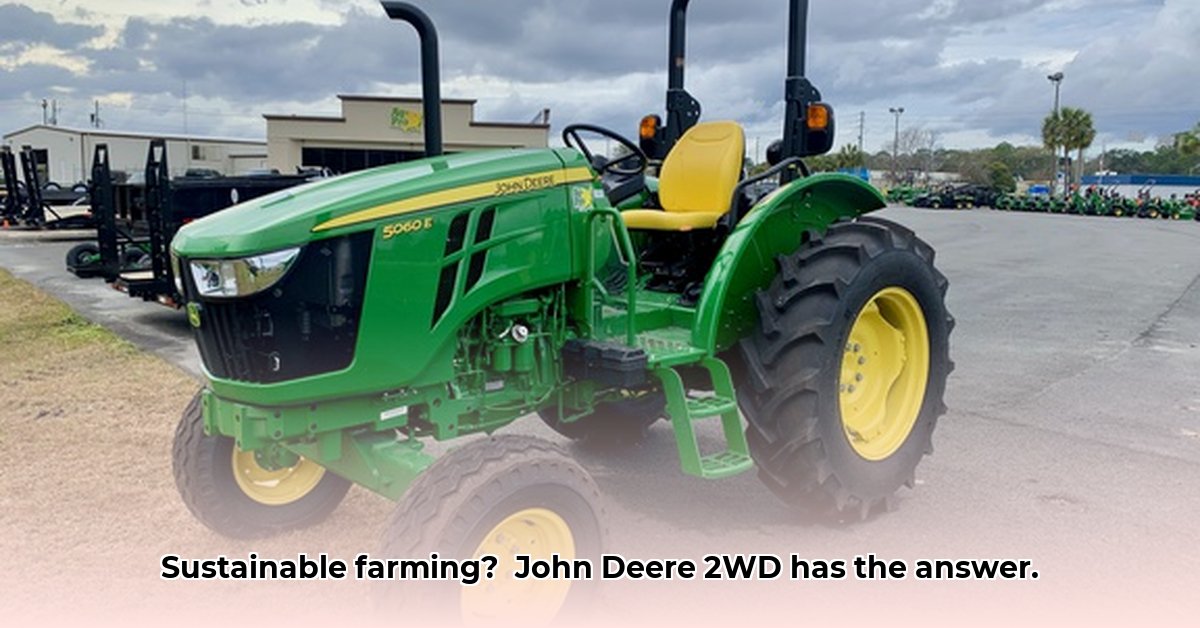
Powering Sustainable Practices with John Deere 2WD Tractors
Farming is evolving. It's no longer solely about maximizing yield; responsible stewardship of the land is paramount. Sustainable agriculture demands innovative solutions, and John Deere's 2WD tractors are playing a crucial role. These aren't just machines; they represent a commitment to efficient and environmentally conscious farming practices. This article explores how these tractors contribute to—and sometimes challenge—the pursuit of sustainable agriculture. We'll examine the technology, real-world applications, and inherent challenges. For more information on John Deere's commitment to sustainability, visit their sustainability page.
Fuel Efficiency and Engine Technology: Optimizing Resource Use
The roaring, fuel-guzzling tractors of yesteryear are relics of the past. Modern John Deere 2WD tractors boast significantly improved fuel efficiency. Advances in engine technology, such as precision fuel injection (a system that precisely meters fuel delivery for optimal combustion), have drastically reduced fuel consumption per acre. This translates to direct cost savings for farmers and, critically, a smaller carbon footprint. How much fuel is saved? While precise figures vary by model and operation, many farmers report reductions of 15-20%, a considerable impact on both profitability and environmental sustainability. Isn't it remarkable how engineering innovation can directly translate to environmental stewardship?
Precision Farming: Technology for Smarter Resource Management
Precision farming is transforming agriculture. Modern John Deere 2WD tractors often integrate GPS technology and automated steering, enabling pinpoint accuracy in fertilizer and pesticide application. Imagine a tractor knowing exactly where it's been, precisely controlling the amount of inputs needed in each area. This minimizes waste, reduces fertilizer runoff into waterways (a major source of water pollution), and decreases pesticide use, protecting beneficial insects. Experts estimate potential fertilizer reductions of up to 20% through these technologies, showcasing the powerful potential impact on environmental sustainability. This technology is a significant step towards responsible resource management, improving efficiency and environmental performance.
Tractor Size and Power: Adaptability for Diverse Farming Needs
John Deere offers a diverse range of 2WD tractors, from compact models suited for small-scale organic farms to larger, more powerful machines for extensive operations. This scalability is vital for sustainable agriculture. Smaller tractors, ideal for smaller farms or specialized crops, consume less fuel and minimize soil compaction, promoting healthier soil ecosystems. Larger models, while consuming more fuel, can still contribute to sustainability through optimized operations on larger acreages. The ability to select the right tractor for the right job allows farmers to maximize efficiency and minimize environmental impact. It is important to select the appropriate sized equipment for your intended task, and this is especially important when considering sustainability.
Real-World Success Stories: Farmers Leading the Charge
These aren't just theoretical benefits; farmers are experiencing real-world success. Sarah Miller, a farmer in Iowa, reported a 15% increase in crop yield while simultaneously reducing water usage by 10% using her John Deere 2WD tractor coupled with precision farming technology. Similar stories abound, demonstrating the tangible positive impacts of these technologies. While these results vary based on many factors, they underscore the effectiveness of these technological advancements in achieving both higher yields and reduced environmental impact. This is a positive message for adopting more sustainable farming methods. This is a testament to collaboration between technology and sustainable practices.
Challenges and Considerations: Navigating the Path to Sustainability
Despite the advantages, it's crucial to acknowledge potential limitations. The upfront cost of advanced technologies can be prohibitive for many farmers, especially smaller operations. Access to financing or governmental subsidies is often a critical factor. Furthermore, the environmental impact of manufacturing the tractors themselves must be addressed. John Deere, like other manufacturers, is actively working to mitigate its carbon footprint, but this remains an ongoing challenge. Data privacy is also a critical consideration, as the increased use of data in precision farming necessitates robust security measures and transparent data usage policies. Finally, the balance between technological dependence and the preservation of traditional farming knowledge requires careful consideration; technology should augment, not replace, experienced insights.
John Deere's Commitment to Sustainability: The Future of Farming
John Deere 2WD tractors represent a significant step towards sustainability in agriculture, but it’s an ongoing process. The company is committed to continuous innovation, focusing on improving fuel efficiency, reducing emissions throughout the production cycle, and making precision technology more accessible. A truly sustainable agricultural future necessitates collaboration among manufacturers, farmers, and policymakers. The integration of technology and traditional knowledge is essential – technology empowering farmers, not replacing their expertise.
Addressing Key Challenges: Working Towards Solutions
| Challenge | Potential Solutions |
|---|---|
| High Initial Costs | Government subsidies, leasing programs, financing options, exploring used equipment. |
| Data Privacy Concerns | Clear data usage policies, robust security measures, user control over data sharing. |
| Environmental Impact of Manufacturing | Sustainable manufacturing practices, responsible sourcing of materials, end-of-life equipment recycling programs. |
This exploration highlights the significant contribution of John Deere 2WD tractors to sustainable farming. While challenges remain, the ongoing commitment to innovation and responsible practices paints a promising picture for a more sustainable agricultural future. The future of food production depends on this continuous evolution.